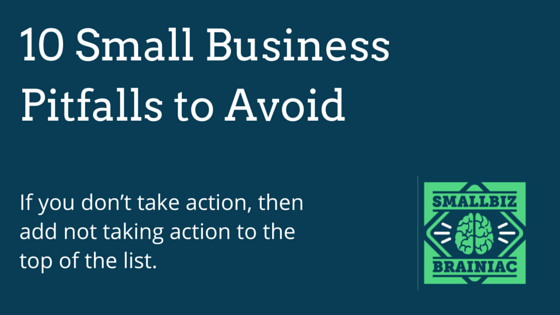10 Small Business Pitfalls to Avoid

10 Small Business Pitfalls You Must Avoid
Owning and running a small business is not easy. There is a lot of competition out there, and while you struggle, they seem to have it all figured out. Everyone wants your time and attention including vendors, regulators, suppliers, employees, customers and your family. You are constantly being sold to, negotiated with, and solicited. It’s annoying!
There are a thousand to-do’s on your list, but you end up putting out fires all day, leaving you no time to work strategically. When you lose focus, you spin your wheels and end up reacting to issues, rather than completing projects that drive your business forward.
This list isn’t a silver bullet to success. It won’t solve your time management problem or make you a market leader. But, if you don’t address these 10 pitfalls and you end up tumbling into one of them, you’ll waste a lot of time and energy clawing your way out.
Once you’ve read through the list and identified those that are most applicable to you, rewrite and organize your to-do list and assign priority status to those tasks which mitigate these perils. If you don’t take action, then add not taking action to the top of the list.
1. Screwing up on payroll taxes:
If you don’t have the time or the experience, or if you don’t have the right qualified employee who can guarantee compliance with payroll tax laws, then you need to outsource your payroll to a reputable payroll service provider or PEO. There are a lot of great options out there and the cost is well worth the peace of mind. The last thing you need is the IRS chasing you to collect the trust fund portion of your payroll tax liability that your office manager didn’t pay over the past year.
Did you know that you are personally liable for the payment of these taxes? You can’t discharge them in corporate bankruptcy and the IRS can now go as far as taking away your passport to collect.
2. Misclassifying workers as independent contractors:
You don’t want to discover years later that you should have been treating that independent contractor as an employee all along. The defense costs, judgments, and penalties can put you out of business. The IRS has made it a priority to enforce employee classification compliance in 2016.
If you are paying an independent contractor you need to examine the IRS Common Law Rules and take the 11 point test to make sure you have them properly classified. Slap the facts of your situation up against the test questions and find out now, rather than later.
3. Not understanding the difference between profit and cash flow:
If you don’t know the difference between profit and cash flow, then right after you finish reading this, go to www.khanacademy.com, create an account and search for these two videos and watch them:
1. Cash accounting | Cash versus accrual accounting (3:58), and
2. Basic cash flow statement | Three core financial statements (3:43).
This will be the most valuable 8 minutes (10 minutes including sign up time) you will spend all day. If you don’t have a basic understanding of the territory you’ll find yourself in hot water at some point in the near future, and it may be too late by then to save yourself.
I’ve seen this happen time and time again. Your business is growing and the cash is flowing in. You are hiring new employees, but you forget that your federal and state unemployment taxes are due every quarter. If you aren’t booking the liability and setting those funds aside, you could find yourself in a pinch on their due date, especially if sales slow down or a large client doesn’t pay you on time. Receivables turn-over is a key indicator that must be vigilantly monitored.
4. Not managing your workers’ compensation insurance costs:
This is a long term play. Work comp insurance is experience rated which means one of the cost factors is your past claims history i.e. your experience. Over time, you develop what’s called an experience modifier. Once that has been published by the appropriate rating bureau, whatever insurance company you choose to buy this mandatory insurance from, will apply your experience modifier to your premium calculation when arriving at your net cost.
This isn’t the only factor, but it is the one you can control, and if you neglect it, you’ll be at a disadvantage in relation to your competitors. For industries where work comp insurance premium rates are a high percentage of gross payroll, this can be the difference between winning or losing new business.
There is a lot that goes into managing your experience modifier but at the end of the day, it is all about workplace safety, low claims frequency and avoiding large losses. For a clerical office, this is not a big deal, but for a manufacturing company, it is. Hire an occupational safety specialist to come in at least once a year and inspect your operations, identify and correct hazards, train your employees, and develop an illness and injury prevention plan for you to implement.
5. Not paying competitive wages:
To compete you need top talent. To get the star players, you need to pay competitive wages. One of my favorite take aways from the book Good to Great by Jim Collins, is that you have to get the right people on the bus first. With the right people on the bus, whatever service or product you provide is less relevant to your success. You may not be able to pay for top talent out of the gate, but as your business grows, it becomes even more important.
It took 7 years before I could start paying enough to get the right people on the bus. In hindsight, I should have bucked up a lot sooner. That decision delayed our success and created a lot of headaches and wasted a lot of time.
6. Not buying the right business insurance:
Get a great insurance agent who specializes in your industry. Get an agent who is a Chartered Property Casualty Underwriter (“CPCU”). Unless your brother-in-law is a CPCU, don’t use your brother-in-law. Carefully assess your risk of loss and determine what size deductible you are able to take. Make sure your agent shops around and presents you with multiple quotes.
Don’t use multiple agents, because you’ll end up with multiple quotes from the same insurance company. This is known as shotgunning, and insurance companies hate it when you do that. At a minimum, get a Business Owners Policy which is like a combo meal. It contains multiple products and will cover all the basics.
Be sure to review your coverage annually. Have your agent start shopping the market three months before your renewal, and take the time to going over the coverage with you. Before making a purchase, have your agent give you a coverage comparison between the two best premium quotes you received.
Polices can vary as to the coverage they offer, so the lowest premium policy might not be the best value. I like the Farmers school of insurance commercials because that is exactly the point they are trying to make.
7. Poor management team:
In the early stages of your business it might make sense for you to cover all the key positions yourself. However, at some point you will have to hire key managers if you want to take your enterprise to the next level. It’s the only way you will create a sustainable business.
If you want to bring your A game, you’ll need an A team. It takes time to find the right fit, so be patient and methodical. The biggest mistake made during this process is not paying the freight to get goods. According to Gallup, the analytics company, businesses fail to choose the candidate with the right talent for the job 82% of the time. Those are not good odds. Chances are you won’t get it right the first time. So here is my advice, be slow to hire and quick to fire.
8. Not using an attorney at the right time:
Attorney’s are jerks. One of my best friends and business partners is an attorney, and he’s a jerk. But, he’s my jerk, and I get my jerk involved in issues early on, before they turn into lawsuits.
If you are in business long enough, you’re going to need an attorney. Get to know one. Develop a relationship with an attorney now and ask them for their advice every once in a while. You don’t have to take it all the time, but you’ll be glad you have a jerk of your own when the time comes.
9. Inadequate technology and business processes:
There are so many incredible business software applications available today that there’s really no excuse for being behind the times. With cloud based computing and software subscriptions you can run your business in a highly automated way at a low cost. Choosing the right combination of products can be overwhelming.
The answer is to either hire a small business IT consulting firm to help you navigate the waters, or slug through the process on your own by taking the time to do the research and learn what options are available. You can demo most applications for a few weeks by giving them your contact information however, the company will call you right away and start the sales process. The trick here is to manage their expectations and never lead them to believe you are enamored with their software. Once they smell your excitement, they’ll be all over you like a high school lover.
10. Not delegating:
Speaking of high school, this should be a required course. According to North Carolina State University, delegation is assigning responsibility and authority to someone in order to complete a clearly defined and agreed upon task while you retain ultimate responsibility for its success.
They say delegation improves organizational efficiency and development. This is one of the most important management skills you can posses and if you want to succeed, I mean really out perform, you must learn to delegate.
This is something I’ve struggled with my entire career and although I’ve made significant progress, there’s still room for improvement. In fact, I believe that my ability to level up depends on my successful development of this skill. The best way for me to do that, is to help my management team delegate their workload, so that they are only performing tasks specific to their management responsibilities.
Conclusion
There they are. I can hear the trumpets sounding…ten golden nuggets of wisdom. Ten shining beacons by which to navigate your vessel. Well, maybe that’s an exaggeration, but they are important. If they don’t all apply to your situation, then simply modify the list to accommodate your specific situation. Then you can focus on them, one at a time and start sleeping a little easier at night

